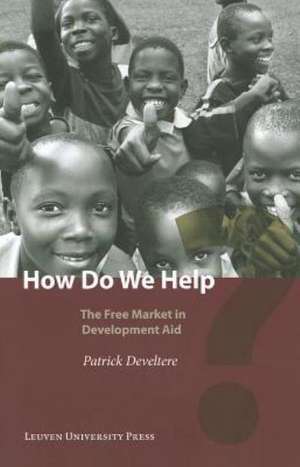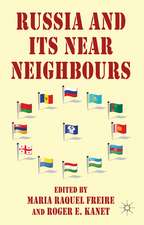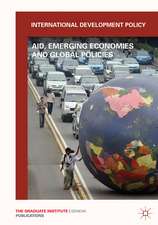How Do We Help?: The Free Market in Development Aid
Autor Patrick Develtere Huib Huyse, Jan Van Ongevalleen Limba Engleză Paperback – 31 mai 2012
Over the past 50 years the West has invested over 3000 billion euro in development aid and already tackled many problems. Now more and more countries and organizations present themselves on the development aid scene, including China, India, and foundations such as the Bill and Melinda Gates Foundation. Companies, trade unions, cooperatives, schools and towns set up their own projects in remote African regions.
But can each and everybody become a development worker? Who decides what is acceptable and what is not? What is the role of the developing countries themselves? Who can tell what is good aid and what is bad aid? Is it a free market allowing everybody to do what he wants? A market without rules, with a lot of competition and little cooperation?
This book draws up the balance sheet of 50 years of development aid and provides an overview of all relevant players, of opportunities and obstacles, of successes and failures. It details numerous examples and information on development projects from all over the world. Readers may be tempted to get involved in development aid, but they will also be more cautious than before.
Preț: 132.27 lei
Nou
25.31€ • 26.43$ • 20.95£
Carte disponibilă
Livrare economică 15-29 martie
Livrare express 01-07 martie pentru 32.90 lei
Specificații
ISBN-10: 9058679020
Pagini: 264
Dimensiuni: 155 x 234 x 20 mm
Greutate: 0.52 kg
Editura: Leuven University Press
Cuprins
Content
Preface
Introduction
Development cooperation: community, arena and, increasingly, market
An expanding community
An arena with plenty to fight over
A market with many transactions
From colonialism to the Millennium Development Goals
Colonial warm-up exercises
Technical cooperation and knowledge transfer
Faith in development aid
Development cooperation: aid in a global setting
The Washington Consensus and structural adjustments
International cooperation and the Millennium Development Goals
Addressing poverty in exchange for debt relief
Is Paris introducing order to the market?
More than development aid
Cooperation means partners
Internationally: among specialists
Recipient countries: donor darlings and donor orphans
Ocial bilateral cooperation: fractions and fragmentation
Small players and institutional pluralism
In search of an institutional foundation for development cooperation
Decentralisation in order to get closer to the public, or for other reasons?
Europe's development cooperation patchwork
Seeking identity and complementarity
From Yaoundé to Cotonou: from association to agreement Strengths and weaknesses of the ACP-EU partnership
The Cotonou Agreement
The European Development Fund
Other instruments
Europe: a major pioneer?
A choice in favour of Africa?
Multilateral cooperation: the UN galaxy
The UN and development cooperation
The World Bank: not a cooperative
Regional development banks
The United Nations Development Programme
The rise of new vertical programmes on the UN market
`Deliver as one': seeking cooperation on the market
The NGDOs: bringing values onto the market
A movement with many faces
A sector with many roles
Several generations of NGDOs
A sector with many dierent visions and strategies
A movement with a plural support base
The sector breaks free from the NGDOs
Is a new social movement becoming a network movement?
A fourth pillar on the market
The key players of the fourth pillar
A new generation of altruists?
Starting from a different field
An alternative way of working
Mainstreaming development cooperation
Humanitarian aid: in good shape or going downhill?
What place for emergency aid?
Needs and promises
Cash-and-carry on the market?
The unbearable lightness of the support for development cooperation
The uneasy relationship with the support base
No (more) aid fatigue?
Popular, yet little understood
Something needs to be done: but by whom?
Drawing up the balance sheet
Progress, but too little, too slowly and not for everyone
Are we really that generous?
Who is receiving aid?
The effectiveness and impact of development cooperation
Development cooperation: a stumbling-block?
Conclusion
Abbreviations
Endnotes
Glossary
Bibliography











![Security Arabic [With MP3]: Britain's War in Northern Ireland](https://i1.books-express.ro/bt/9780748646616/security-arabic-with-mp3.jpg)





